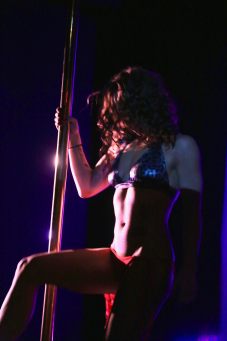Fringe Femmes 2022 are a bold cohort of women who are presenting new plays, original works and solo shows that have raised the bar on what it means to be an artist, tell one’s story and continue the work by any means necessary. Each year I am reminded that no matter the obstacles or the times in which we live, you cannot stop theatre as an art form from expanding, thriving and being a vessel to reveal, heal and nurture. LAFPI has the special ability to connect women from a wide variety of cultures and experiences together in their shared love of theatre.
This year continues to expand on that legacy and I am thankful to be able to introduce Fringe Femme Charlotte Galbreath. Charlotte’s Looking Past Loss is a personal and vulnerable solo show that explores the traumas that simmer beneath the surface, yet eventually always rise to the surface. How did COVID-19 force you to reckon with yourself and old traumas? Charlotte investigates her own family stories and what she discovers may be a lesson for us all.
Constance Strickland: What’s been your biggest battle in terms of your development/process?
Charlotte Galbreath: My biggest battle has been honoring the accuracy of my relative’s stories and experiences while exercising my own artistic freedom in the process. With an autobiographical show that features key figures in my own life, I want to do justice to their trauma while also serving the play and message being sent at large. Thus, I’ve had to navigate that balance of preserving their truths while expressing mine as well.
Constance: After the lights and the audience disappear what do you hope one takes away after seeing your show?
Charlotte: I hope that my audience takes away the power of what loss can do for us. While it is undoubtedly a painful part of life, it yields new meaning to our existences if we let it, so I encourage the audience to reconsider how the darkness in their own lives can be turned into a motivating factor that gives us a profound sense of purpose in life.
Constance: What joy did you discover when creating your show?
Charlotte: I discovered the joy of life and the preciousness of it throughout my process. Having to reflect on my losses and trauma has allowed me to have a greater appreciation for everyone in my life. It also has reframed my interactions with others as I’m constantly thinking about how I can be the light in other people’s lives. It was definitely a challenging feat having to reflect upon these losses in my life, but it’s also served as a healing process.
Constance: What has been the most delicious discovery as you created your original work.
Charlotte: As an actor, I’ve always been drawn to the power of theater to enact change, but as I’ve created my work, I’ve realized the extent to which I can reach and move audiences. My solo play that explores different memories of loss highlights the highs and lows of this journey, and guides the audience to the light at the end. Bringing the audience on this ride with me, they’re able to see for themselves how to reframe the darkness we feel during the lows, giving hope to a world that has felt so hopeless the past couple of years.
Constance: How does it feel to have an opportunity to share your work with an in-person audience?
Charlotte: It is an incredible opportunity finally sharing this with an in-person audience because it brings everyone together on this journey, creating a support network amongst the entire audience experiencing these memories simultaneously. Since many of these memories are painful to live through, I recognized the importance of finding levity throughout to make the piece more digestible and to capture the highs and lows of this whole process.
Constance: What influenced this new work? How long have you been sitting with this work? Why now?
Charlotte: I have been working on this solo play for the past couple of years, but had a change in perspective on how I wanted to end the performance and the message I wanted to leave the audience with over the past year. With Covid, all the political tension, racial discrimination, and losses we’ve all experienced over the past couple of years, I feel like this story needs to be told in order to give hope to our world and show that there is a way out of all the darkness. Theater has the power to take audiences on a journey and make them consider how the story being portrayed and message being sent can translate to their own lives, and this is crucial right now with the play I’m performing.








